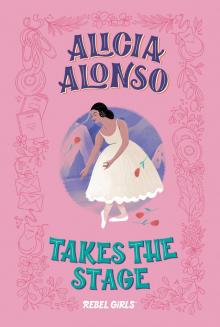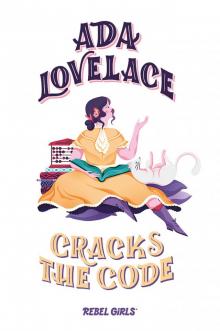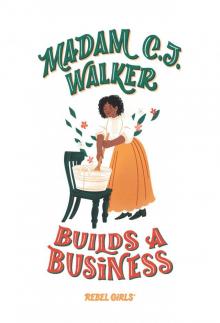- Home
- Rebel Girls
Madam C.J. Walker Builds a Business Page 4
Madam C.J. Walker Builds a Business Read online
Page 4
“Pick something that suits you, baby,” Sarah said.
Lelia ran her fingers across the glittering jewelry, choosing an ivory cat pendant with blue diamond eyes. Sarah bought herself a pair of diamond hair clips.
After they left the store, Lelia treated her mother to dinner, then the two of them strolled down the street, arm in arm. Their new jewels sparkled in the street lamps’ glow.
Sarah snuck a peek at her daughter. Her businesses and work were important. But right there in that moment, all that really mattered was Lelia.
CHAPTER TWELVE
In the heat of the summer sun, Sarah stood in a sea of protestors she’d helped prepare for battle. They had all gathered for the same reason: to demand an end to lynching in America.
“Remember why we’re here,” voices shouted in the crowd before they all fell silent.
Across the river from where Sarah had lived in St. Louis, white mobs had lynched at least thirty-nine black people, injured hundreds more, and burned down homes and businesses. Sarah’s anger had not dimmed through those years. She’d grown even more furious, and wouldn’t let anything stand in her way. It still hurt her heart to remember how her first husband, Moses, had disappeared in the middle of the night.
Lord only knows what they did to him, Sarah thought. That shouldn’t happen to anyone ever again.
As they marched, more and more people joined until there were ten thousand marching and twenty thousand more lining the streets. They protested in silence to pay respect to the victims, every mouth closed shut. The only sound was the shuffle of feet as they swept toward the center of the city, like a gigantic ocean wave, ready to change history.
After the protest, the United States government did not respond. So Sarah and the organizers of the silent march hustled themselves on a train headed for the White House.
President Woodrow Wilson had agreed to meet with them, and they intended to make their demands known at that meeting. They wanted the president to make lynching a crime and prevent it from happening ever again.
“We love America,” Sarah said, as she and the other black leaders walked up the marble steps of the White House. “It’s time America loves us back.”
Sarah felt her hopes soar as they were ushered into the magnificent building. Her heart beat faster with every passing minute, thinking about what she was going to say to the most powerful man in the country.
She nearly jumped out of her seat when the door opened.
“I’m sorry, but the meeting has been cancelled,” a messenger told them. “The president is working on a bill for the Department of Agriculture and doesn’t have the time to see you.”
Sarah’s ears started ringing, as if another headache was coming on. The president of the United States had decided that seeds and manure were more pressing than the lives of black people!
Her insides twisted with rage.
~
Fury still coiled in Sarah’s belly as she thought about what she was going to say in her big speech at the 1917 Madam C. J. Walker Beauty Culturists Union in Philadelphia.
Two hundred women flooded the conference center wearing their finest clothes. With long, healthy hair, each was proof of what Sarah’s products could do. Dozens of women stepped onto the stage to tell their stories, of how they had gone from maids to community leaders, from working their fingers to the bone to accomplished saleswomen.
“I can feed my family and send my boy off to college this year,” one woman proclaimed.
“I was so grateful to put down my scrub brush and pick up a hair brush,” another said. “My salon is the most successful in town!”
When Madam C. J. Walker finally took the stage, the room exploded with excitement. First, Sarah gave away prizes to those who had trained the most new agents, who had the highest sales, and who had recycled the most tins. The prizes motivated her agents to sell more products and work harder at their salons, bringing the company even more profits.
Then it was time for her speech.
Sarah knew just what she wanted to say. She told the story about her failed meetings with the YMCA board, with Booker T. Washington, and the president. She told the story of all the doors that had been slammed in her face. Because she was black. Because she was a woman. Because she was poor. But when she’d put her mind to it, she had built the biggest hair product empire the country had ever seen. And she had to use all of that money and influence for something positive.
“This is the greatest country under the sun,” she stated passionately. “But we must not let our love of country stop us from protesting against injustice. We must resist until massacres like what we saw in St. Louis are rendered forever impossible!”
The women at the convention were so moved by Sarah’s speech that they wrote a letter to the president. The letter demanded that the government ban lynching in America forever.
The president did not change the law. But Madam C. J. Walker had done something great. She’d shown a group of women that they, too, were powerful.
CHAPTER THIRTEEN
Sarah loved living with Lelia in Harlem, but it was time to settle into a place of her own. She chose a neighborhood just north of New York City, where the rich Tiffany and Rockefeller families would be her neighbors. Sarah didn’t know if they would be happy to have a former washerwoman living among them, but she didn’t care. She was the most successful black businesswoman in the country and wanted everyone to know it.
“My house must be grand! Thirty, no, thirty-four rooms. It must feel like the luxurious palace of a queen,” she told the famous black architect, Vertner Tandy, as they walked up the grassy patch of land she’d bought for her new home. “White stucco walls! Greek columns! Balconies . . . one on either side! A sweeping front lawn here, and a gated driveway . . . ”
Sarah stepped through the dewy grass with purpose, and Vertner had to hurry to keep up with her. The architect tripped on an exposed root, scrambling to stay on his feet, but Sarah did not slow down. “Come along, Mr. Tandy. I want the swimming pool here, a two-story patio here, and the fountain there . . . ”
The architect pushed up his glasses as he jotted down more notes, adding to his nearly-full pad of paper. He bobbed his head at Sarah’s every whim. Whatever Madam C. J. Walker wanted, she would get.
“Off this side, I want a grand ballroom,” Sarah said. “Spare no expense, Mr. Tandy. And make sure that the dining room and sitting rooms can hold at least thirty people each. I expect I’ll be entertaining often. Especially around the holidays.”
Sarah clapped her hands together then pressed them to her mouth. She felt like dancing as she gazed over her very own land. She wondered what her parents and Moses would think. “I wish you were here to see it,” she murmured.
“What was that, Madam Walker?”
“Nothing, Mr. Tandy. Let’s get to work.”
~
Lelia usually found her mother in her garden when she came to visit. Sarah loved her new home with its sweeping terraces, high ceilings, and gorgeous artwork, but she especially loved her garden. She put on her overalls and got to work, bending down in the shadow of her towering mansion like she was ready to pick cotton. The only difference was that Sarah now wore her hair loose. She hadn’t wrapped it up in years, except at night in a silk scarf.
Sarah hummed as she worked. Though her health was fading, she still managed to get outside every day. She loved working the soil, pulling weeds and watching her seeds spring to life, just like magic.
“I brought you some lemonade, Mama,” Lelia called. “You should let the groundskeepers do that.”
“Hush, child,” Sarah laughed. “It calms me.”
The hem of Lelia’s dress brushed the dirt as she helped her mother up. “I came to say goodbye, Mama, but I have time for lunch before I catch my train.”
Madam C. J. Walker had hung up her feathered hat and was Sarah Breedlove again. Now it was Lelia’s turn to travel all over the world. Her daughter was headed to Cuba, the Caribb
ean Islands, and then to Panama. Sarah wished she could travel with Leila, but Sarah’s doctors insisted that she rest as much as possible.
Sarah set her gardening gloves aside and walked arm in arm with Lelia to the shade. “Travel well, daughter. I’ll be right here when you get back.”
Sitting beside Lelia, Sarah sipped a sweating glass of lemonade and looked across her estate grounds. She thought about how far she had come from the fields filled with fluffy, white cotton. Now she was surrounded by fountains, flowering trees, and lovely blossoms.
She took a deep breath and let it out slowly. The air smelled of home.
AFTERWORD
Madam C. J. Walker (Sarah Breedlove Walker) died at age fifty-two in 1919, from hypertension and kidney failure. When she died, she was worth about $600,000 (equal to about $6 million today). She is now known as America’s first female self-made millionaire. Her company closed down operations in 1981, but her famous brand was relaunched by Sundial in 2016.
At thirty-four years old, Lelia became president of the Madam C. J. Walker Manufacturing Company. Lelia traveled the world. When she returned to the United States, she decided to transform her image and renamed herself “A’Lelia.” A’Lelia continued to live a glamorous life in Harlem until her death in 1931.
Before his death in 1915, Booker T. Washington eventually sought out Madam C. J. Walker as a donor for his Tuskegee Institute in Alabama. At first, Sarah politely declined. Then she mailed him a five-dollar bill. Later, she provided many scholarships to Booker’s students, and in turn he offered beauty courses at his university.
Annie Turnbo outlived Madam C. J. Walker by several decades, but her business never did as well. Today, Annie has been recognized for her role in inspiring the conversation around natural hair care for black women. Where before there were so few products, now dozens of brands line shelves across the country.
Before she died, Sarah had a special request of her land and property: “[My home] will be left to some cause that will be beneficial to the race—a sort of monument.” The New Voices Foundation uses her mansion, Villa Lewaro, as a place where female entrepreneurs of color can learn to build, grow and expand their businesses.
Even in death, Sarah continues to support and lift up black people.
Acknowledgments
We couldn’t have created this series without the incredible women who inspire us. Madam C. J. Walker changed the face of business with tenacity and determination. We love her entrepreneurial spirit!
Thank you, Denene Millner. You tackled the hard subjects in Madam C. J. Walker’s life with care and attention. You are a legend in your own right. Thank you, Salini Perera. You created such beautiful illustrations. Monique Aimee, the cover lettering is gorgeous! And thank you to our brilliant copyeditors and proofreaders Susan Nicholson and Taylor Morris.
To iFundWomen, your support and partnership have been amazing. We are thrilled to have you on board for this exciting project.
And to the Rebel Girls of the world, we are nothing without YOU. Your support is what keepsus aiming higher and fighting harder. Keep resisting, keep pushing, keep creating!
About Rebel Girls
Rebel Girls is a cultural media engine on a mission to balance power and build a more inclusive world. It is best known for the wildly successful book Good Night Stories for Rebel Girls, a collection of one hundred tales of extraordinary women throughout history.
Good Night Stories for Rebel Girls, published in 2016, was an overnight sensation, becoming the most successful book in crowdfunding history. The title has since been released in over eighty-five territories around the world. Following the book’s triumph, Rebel Girls released Good Night Stories for Rebel Girls Volume 2 and I Am a Rebel Girl: A Journal to Start Revolutions. Good Night Stories for Rebel Girls is also a podcast, highlighting the lives of prominent women with beautiful sound design.

 Alicia Alonso Takes the Stage
Alicia Alonso Takes the Stage Ada Lovelace Cracks the Code
Ada Lovelace Cracks the Code Madam C.J. Walker Builds a Business
Madam C.J. Walker Builds a Business Dr. Wangari Maathai Plants a Forest
Dr. Wangari Maathai Plants a Forest Junko Tabei Masters the Mountains
Junko Tabei Masters the Mountains